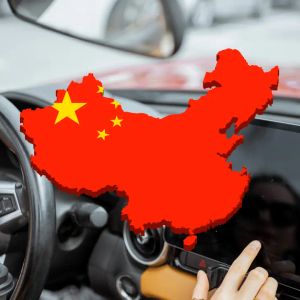China’s auto industry is reportedly inflating its sales figures by exporting brand-new cars as “used”
4 min read
The zero-mileage scheme that gained national attention in China after Great Wall Motor publicly criticized it in May has now been revealed to be government-sponsored, according to Reuters. Chinese auto makers attracted global scrutiny after a Reuters investigation revealed the widespread manipulation of vehicle sales figures through the export of so-called “ zero-mileage ” used cars. These vehicles, fresh off the assembly line and never driven, are being registered as “used” before being exported to overseas markets, supposedly to inflate sales numbers artificially. The practice has raised accusations of economic dishonesty and international dumping. This scheme has reportedly been running since 2019, and has flourished with the backing of local governments eager to boost their regional GDP to meet the performance targets set by Beijing. Auto sales scandal raises eyebrows Reuters found that at least 20 jurisdictions, including major export areas such as Guangdong and Sichuan, had publicly supported or facilitated the export of zero-mileage used cars through tax incentives, infrastructure support, and special export licenses. Shenzhen’s development commission announced its plans to include zero-mileage used cars in its target to export 400,000 vehicles in 2024. Guangzhou created new vehicle registration quotas specifically for zero-mileage gasoline cars, despite environmental restrictions. And in Sichuan, authorities partnered with e-commerce platforms like Alibaba to promote the online sale of these cars. “The goal is simple: show sales growth and hit performance targets at any cost,” Tu Le, a U.S.-based analyst and the founder of Sino Auto Insights, said. “It’s the result of a four-year price war that’s pushed carmakers to the edge.” The result has been an explosion in used car exports. Industry insiders have estimated that 90% of China’s 436,000 used car exports in 2024 were, in fact, zero-mileage. The incentives for local governments don’t stop at just sales numbers. Each transaction involves both a “new car sale” and a “used car export,” which means the economic activity is recorded twice, further boosting GDP tallies. According to two industry executives, this makes these transactions particularly attractive for regional officials looking to curry favor with Beijing. Critics are warning that this practice not only threatens the credibility of China’s carmakers on a global scale, but could also trigger retaliation from foreign regulators already wary of China’s growing dominance in the global auto market. Dumping accusations are intensifying The mass export of new vehicles labeled as “used” is distorting foreign markets and fueling accusations that China is “ dumping ” unwanted vehicles overseas to relieve domestic overcapacity. Russia, one of the largest recipients of these cars, issued a decree in 2023 banning zero-mileage used cars from manufacturers with official distributors, directly targeting Chinese brands such as Chery, Geely, and Changan. The Chinese border city of Heihe acknowledged the ban in a public notice, but the affected automakers either declined to comment or failed to respond to inquiries. Other countries are also beginning to tighten definitions of “used cars” to stop the exploitation of this loophole. Jordan, for instance, is mandating a waiting period after a car is registered before it can be classified as used. “The influx is creating friction in markets with established manufacturers and dealership networks,” Michael Dunne, an industry consultant specializing in Chinese auto exports said. “It’s not just about market share—it’s about trust.” Back in China, some company executives are beginning to distance themselves from the practice. Zhu Huarong, the chairman of Changan, warned at a recent conference that zero-mileage exports could “enormously damage Chinese brands’ image” overseas. Xing Lei, who runs the U.S.-based consultancy, AutoXing, also expressed his concern regarding the practice. “If investors start wondering how many sales are real and how many are padded, confidence in the sector could collapse,” he said. Excess production has ignited a bitter price war among automakers, and even subsidized electric vehicles are being offloaded in overseas markets for quick cash. William Ng of Huanyu Auto in Chongqing said his company earned as much as 10,000 yuan, which is about $1,400, in profit per vehicle by reselling EVs bought for 40,000 yuan in Central Asia. Ng complained that independent traders, livestreamers, and TikTok influencers were flooding the zero-mileage used car market, likening it to “selling wine or vases one day and cars the next.” People’s Daily recently condemned the sale of zero-mileage cars within China, but the government has remained silent on the export practice. Neither the State Council nor the commerce ministry responded to requests for comment. On the other hand, the China Passenger Car Association boldly defended the practice as a strategic workaround for global trade barriers, particularly in markets where Chinese brands face entry restrictions or lack consumer recognition. Cryptopolitan Academy: Coming Soon – A New Way to Earn Passive Income with DeFi in 2025. Learn More

Source: Cryptopolitan



